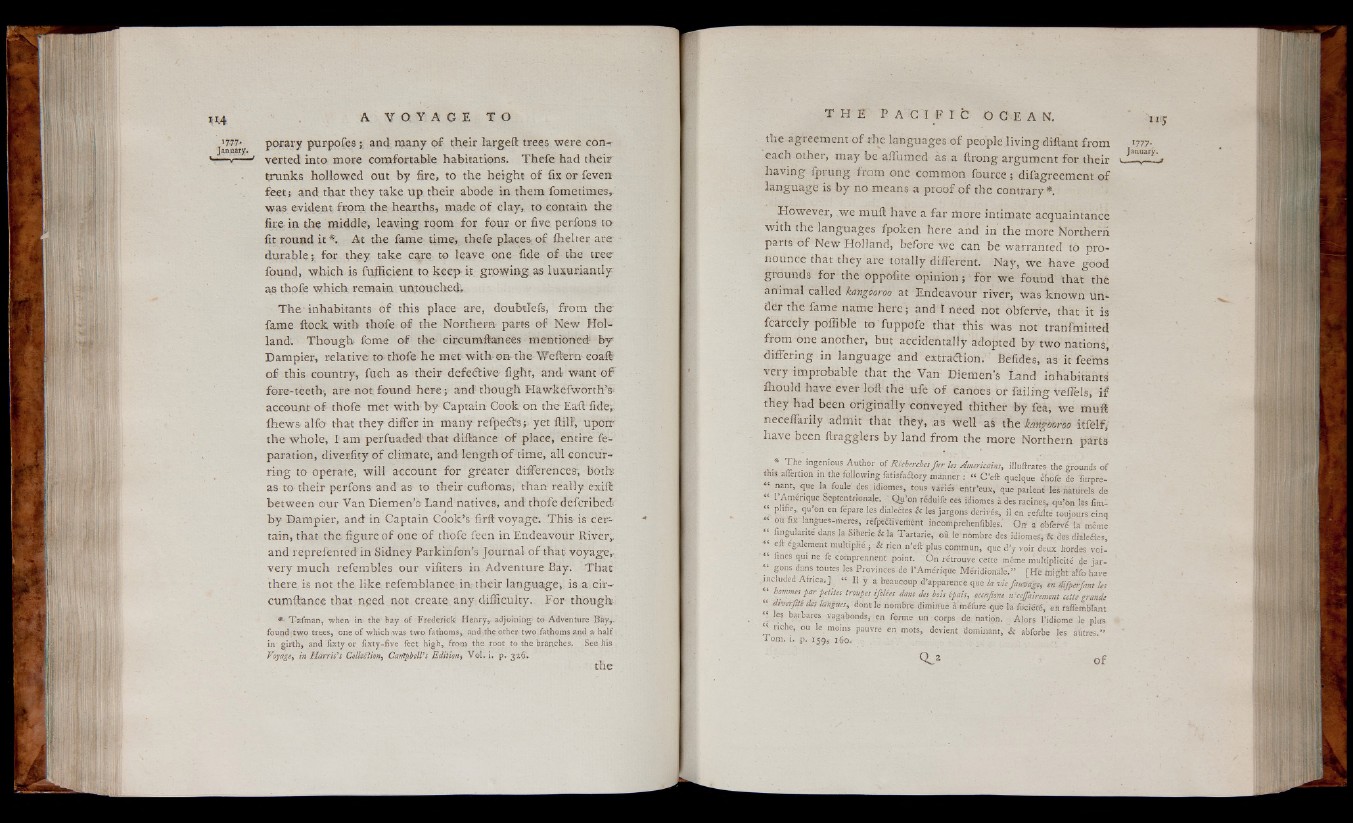
porary purpofesand many of their largeft trees were converted
into more comfortable habitations. Thefe had their
trunks hollowed out by fire, to the height of fix or feven
feet; and that they take up their abode in them fometimes,
was evident from the hearths, made of clay, to contain the
fire- in the middle, leaving room for four or five perfons to
fit round it % At the fame time, thefe places, of fhelter are
durable; for they take care to leave one fide of the tree
found, which is fufficient to keep it growing as luxuriantly
as thofe which remain untouched.
The-inhabitants of this place are, doubtlefs, from the'
fame flock with thofe of the Northern parts of New Holland.
Though fame of the circumftainees mentioned1 b y
Dam pier, relative to thofe he met with-on- the Wefttern-eoa-ft
of this country, fueh as their defective- fight, and, want o f
fore-teeth-, are not found here; and though Hawkefworth’s*
account of- thofe met with by Captain Cook on the Eaft fide,,
fhews alfo that they differ in many refpeits; yet ftill, upon-
the whole, I am perfuaded that diftance of place, entire reparation,
diverfity of climate, and length o f time, all concurring
to operate, will account for greater differences; both
as to their perfons and as to their euftoms, than really exift
between our Van Diemen’s Land natives, and tbpfe defcribed-
b-y Dampier, and in Captain Cook’s firft voyage. This is certain,
that the figure of one of thofe feen in Endeavour River,,
and reprefented in Sidney Parkinfon’s Journal of that voyage,,
very much refembles our vifiters in Adventure Bay. That
there is not the like refemblance in; their language, is a cir-
cumftance that nped not create any difficulty. For though
* Tafman, when in the bay of Frederick- Henry,, adjoining' to Adventure Bay,,
found-two trees, one of which was two fathoms, an d-.th?. other- two.fathoms and a half
in' girth, and fixty or lixty-five feet high, from the root to the branches. See his ,
Voyage, in Harris's Collection^ Cantp.bell's Edition* Vol» i. p. 326;
the agreement of the languages of people living diftant from
each other, may be affumed as a ilrong argument for their
having fprung from one common fource ; difagreement of
language is by no means a proof of the contrary *.
However, we muft have a far more intimate acquaintance
with the languages fpoken here and in the more Northern
parts o f New Holland, before we can be warranted to pronounce
that they are totally different. Nay, we have good
grounds for the oppofite opinion ; for we found that the
animal called kayigooroo at Endeavour river, was known under
the fame name here ; and t need not obferve, that it is
fcarcely poffible to fuppofe that this was not tranfmitted
from one another, but accidentally adopted by two nations,
differing in language and extraction. ’ Befides, as it feems
very improbable that the Van Diemen’s Land inhabitants
ihould have ever loft the ufe of canoes or failing Veffels, i f
they had been originally conveyed thither by fea; we muft
neceffarily admit that they, .as well as the Mtigtorao itfelf,
have been ftragglers by land from the more Northern parts
* The ingenious Author of Recherches fu r les Américains, illuftrates the grounds of
this affertion in the following fatisfaflory mariner : “ C ’eft quelque chofe de turpre-
“ nant, que la foule des idiomes, tous variés eritr’eux, que parlent les naturels de
“ Amérique Septentrionale. Qu’on réduife ces idiomes à des racines,- qu’on lis fim-
“ pIl£f>-:?u’ôn en féPare lés dialeâes & les jargons dérivés, il en refdl'té toujours cinq
ou fix laiïgues-riierès, rêfpeiliVemént iricomprehenfibles.' Oif a dbfeivé la même
fingularité dans la Sibérie &'la Tartarie, où le nombre des idiomes, & des diâleâes,
‘ eft également, multiplié ; & rien n’eft plus commun, que d’y voir deux bordes voi-
fines qui ne fe comprennent point. On retrouve cette même multiplicité de jar-
“ Sons dans toutes les Provinces de l’Amérique Méridionale?” [He might alfo have
included Africa, J « Il y a beaucoup d’apparence que la vie faupage, en difperfant les
‘ hommes par petites troupes ifolces dans des bois épais, oceafions nscejfairemcnt cette grande
“ dmerfité des langues, dont le nombre diminue à méfufe que la fdcïété, en fafiimbfant
‘ç Ics ^Aares vagabonds, en forme un corps de nation. Alors l’idiome le plus
F, nche, ou le moins pauvre en mots, devient dominant, & abforhe les autres.”
Torn. 1. p. 159, 160.